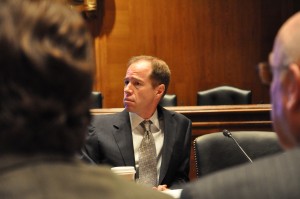
- Allan Coukell watches as members from the FDA and pharmaceutical companies speak about the FDA’s ability to control prescription drugs abroad. (Jacqueline Klimas/MNS)
WASHINGTON – The Food and Drug Administration called on Congress Tuesday to make the laws that govern the global prescription drug economy stronger.
“There’s only so much the FDA can do under the current law,” said Deborah Autor, an FDA compliance director. In a report released Tuesday by the Pew Health Group, researchers looked at the globalization of pharmaceutical production and the domestic distribution of prescription drug, with an eye on how the FDA can more effectively regulate both.
The Pew study found that the FDA often lacks the enforcement capabilities to carry out its mission.
The paper uses case studies to examine what needs to be changed, especially in light of a 2008 infected shipment of the anticoagulant Heparin, which killed 81 people.
The FDA is currently set up to deal only with domestic production of prescription drugs, according to Gabrielle Cosel, the project manager for the study. The governing laws of the FDA date back to 1938, a time when drug production was solely domestic.
“Today’s prescriptions are being produced under last century’s oversight,” Allan Coukell, a director in the Pew Health Group, said in a statement.
Now, in a global pharmaceutical economy where 80 percent of active ingredients in prescription drugs come from overseas, the FDA is unequipped to fully regulate what enters the United States.
“The world continues to become more and more challenging,” said the FDA’s Autor. “Our resources will never really be able to keep up, so we have to think proactively about how to create a system to prevent as many risks as possible.”
While the FDA has increased inspections both at home and abroad, as well as created a drug security office to “regulate for the bad guys,” the administration is still limited by what regulations and standards it can enforce, said Autor.
Much of what the FDA can control about food imports does not roll over to prescription drug control. For example, stopping shipments believed to be infected or dangerous at borders is “a power Congress has decided the FDA should have for contaminated food, but that it still lacks for drugs,” said Pew’s Cosel.
The FDA also does not have the ability to mandate the recall of drugs it believes to be counterfeit.
“We can try to cajole them [suppliers]. We can, if need be, put out our own press release that says, ‘Don’t take this product,’ but we cannot force them to pull those products from the market,” said Autor.
Congress examined holes in pharmaceutical security just last week at a House committee meeting
Michael Russo, a director from the Eli Lilly pharmaceutical company, testified about the importance of regulating counterfeit prescription drugs.
“We recommend legislation to increase penalties for counterfeit and diverted products,” said Russo. “Increased penalties will help to send an important message to criminals engaged in counterfeiting pharmaceuticals.”
Congress is currently working on a five-year FDA reauthorization bill and some members are pushing to change laws that limit the enforcement power of the FDA, enabling it to better regulate foreign pharmaceutical production.
